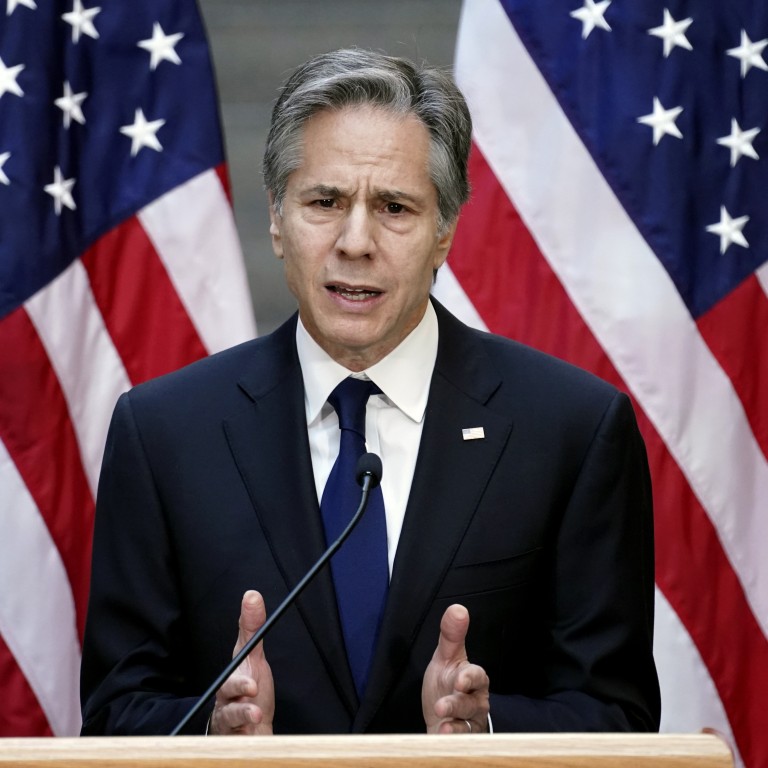
Blinken’s China policy speech unlikely to offer olive branch to Beijing
- The US Secretary of State will deliver a major address in Washington on Thursday but little softening expected towards US-China relations
- No details have been provided ahead of the speech but Antony Blinken is expected to outline a ‘no surprises’ strategy which avoids concessions
The speech, hosted by the Asia Society on the campus of the George Washington University, comes amid frustration in the Biden administration over the Chinese government’s refusal to condemn Russia’s invasion of Ukraine.
Criticism in the department’s annual global human rights report also included a dire assessment of the impact of the national security law – imposed by Beijing on Hong Kong in June 2020 – on the city’s political, media and civil spheres.
While Tuesday’s announcement of Blinken’s policy speech included no details about what aspects of the bilateral relationship would be covered, Biden’s comments during a tour of a Javelin missile plant in Alabama suggested the administration is not planning to offer many olive branches.
“There’s an ongoing battle in the world between autocracy and democracy,” Biden said at the Lockheed Martin factory, adding that his time spent with his Chinese counterpart Xi Jinping helped to reinforce this understanding.
Xi “says that democracies cannot be sustained in the 21st century. Not a joke. They cannot be sustained because things are moving so rapidly, democracies require consensus, and it’s hard to get consensus, therefore they can’t keep up with an autocracy”, Biden said.
“But that’s not going to be the case. If that happens, the whole world changes,” he added.
“Blinken promises to outline a ‘no surprises’ China strategy,” said Robert Daly, director of the Wilson Centre’s Kissinger Institute on China and the United States.
“Familiar phrases and policies will be hammered into a framework under which the United States, like China, extracts what it can from the remnants of economic engagement while managing a failed relationship that neither side has the will or imagination to turn around,” Daly said.
“The goal is to avoid catastrophe while making no substantial concessions. The hope is that things might improve despite the extreme distrust between Beijing and Washington. No better, realistic approach has been defined by either side.”
Will Biden pitch his ‘China challenge’ strategy at summit with Asean?
Blinken’s address will also have to take into account pressure from both parties in Congress to maintain a hard line on Beijing. The speech comes as lawmakers inch towards finalising a sweeping bill designed to boost US competitiveness against China.
The Senate and House of Representatives each passed their own versions of the bill over the past year, and the two chambers are just beginning the final stages of combining them into one final package that in theory could be signed by Biden into law.
It is still unclear what exactly the final bill will look like, but it is expected to contain some US$52 billion in funding for the US semiconductor industry and other funds to help boost scientific research in the US.
Earlier versions of the legislation included a number of provisions meant to strengthen US relations with Taiwan, bolster American multilateral partnerships like the Quad, and create a new human rights official at the State Department focused solely on suspected human rights abuses in China’s Xinjiang region.
Australia’s nuclear sub deal may spark arms race in Pacific, warns China
The bilateral trade relationship has also failed to provide any basis for improved relations.
China’s trade surplus with the US in 2021, the first full year the agreement was in effect, rose to US$355 billion, according to US customs data, up from US$344 billion in 2019.
While purchases of some key commodities, including natural gas and corn have risen sharply, the overall balance has continued to favour China, rising to US$67 billion in the first two months of this year, compared with US$51 billion in the year-earlier period.
US trade office says it has begun process on whether to lift Chinese tariffs
When it comes to trade, Eurasia Group analysts including Michael Hirson said in a research note that “Blinken will probably focus more on efforts to work with allies and like-minded countries than on bilateral negotiations with China”.
“But even if the speech largely repackages existing initiatives, the tone and nuances will nonetheless be important for assessing the outlook for the relationship this year, including the risks over flashpoints such as Taiwan, and how the Biden administration will frame China policy in the run-up to November’s midterm elections,” Eurasia said.
Additional reporting by Jacob Fromer

